[Review] Ciel Fledge: A Daughter Raising Simulator – Nintendo Switch
Ciel Fledge: A Daughter Raising Simulator
Nintendo Switch
Developed By: Studio Namaapa
Published By: Pqube
Category: Role-Playing, Simulation, Lifestyle, Strategy
Release Date: 02.21.20
Parenting. I have no idea how to do it. Ciel Fledge: A Daughter Raising Simulator for the Nintendo Switch is all about raising a daughter, as you may have surmised from the title. I’m going to go ahead and assume the game makes parenting easier than it is in real life, and I’m also going to count that as a good thing. I have nephews and a niece, and I don’t think I’d want to play a game that was completely faithful to the experience of raising actual children based on the smells alone. Although Ciel Fledge does start you off with an amnesiac 10-year-old instead of a baby, and that probably makes things easier. The good news is that despite its questionable status as a faithful representation of the challenge of parenting, it’s a great example of a fun simulation video game.
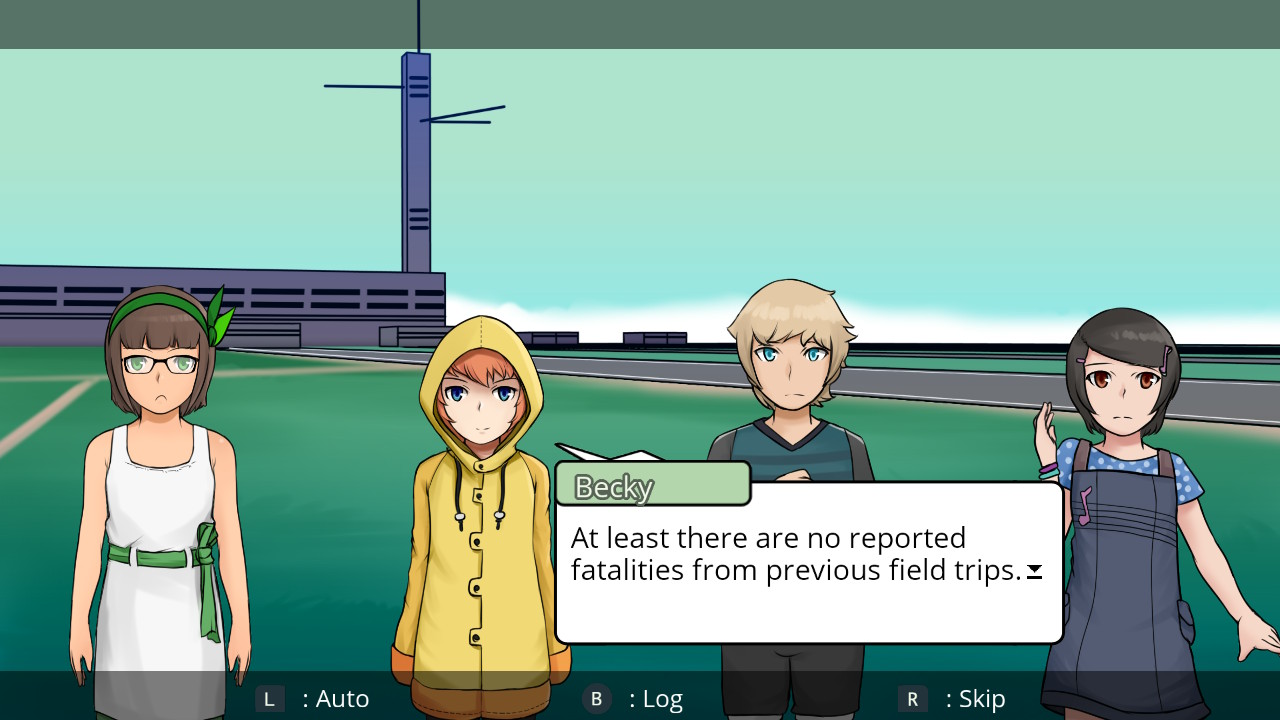
Orphan Fledge
In the year 3716, humanity is on the run from alien invaders known as the Gigant. The game opens with the Gigant destroying Ark-5, one of the remaining airborne cities built by humanity to escape the earth’s ravaged surface. In the wreckage of Ark-5 a young girl is found miraculously unharmed and returned to Ark-3, where the player’s character lives. The girl, named Ciel, is fostered with the player character for reasons that are not made readily apparent. I mean, most foster systems don’t place children with single parents for a reason. But humanity is kind of on the ropes, so it’s something that just kind of gets glossed over early in the game.
Over the next ten years, the player is tasked with guiding Ciel’s development and education. Along the way, the pair meets lots of colorful characters that Ciel can befriend. You’ll help help Ciel deal with her forgotten past, burgeoning friendships, and the realities of life during wartime. It took me a few in-game weeks to warm up to everything about the game, including the story, but after I got over the introductions and tutorials, I was hooked. Watching Ciel grow, watching her life slowly take shape, is a rewarding experience. Her interactions with her friends and struggles with her life round the character out in a relatable way that kept me engaged and invested throughout the game’s grind.
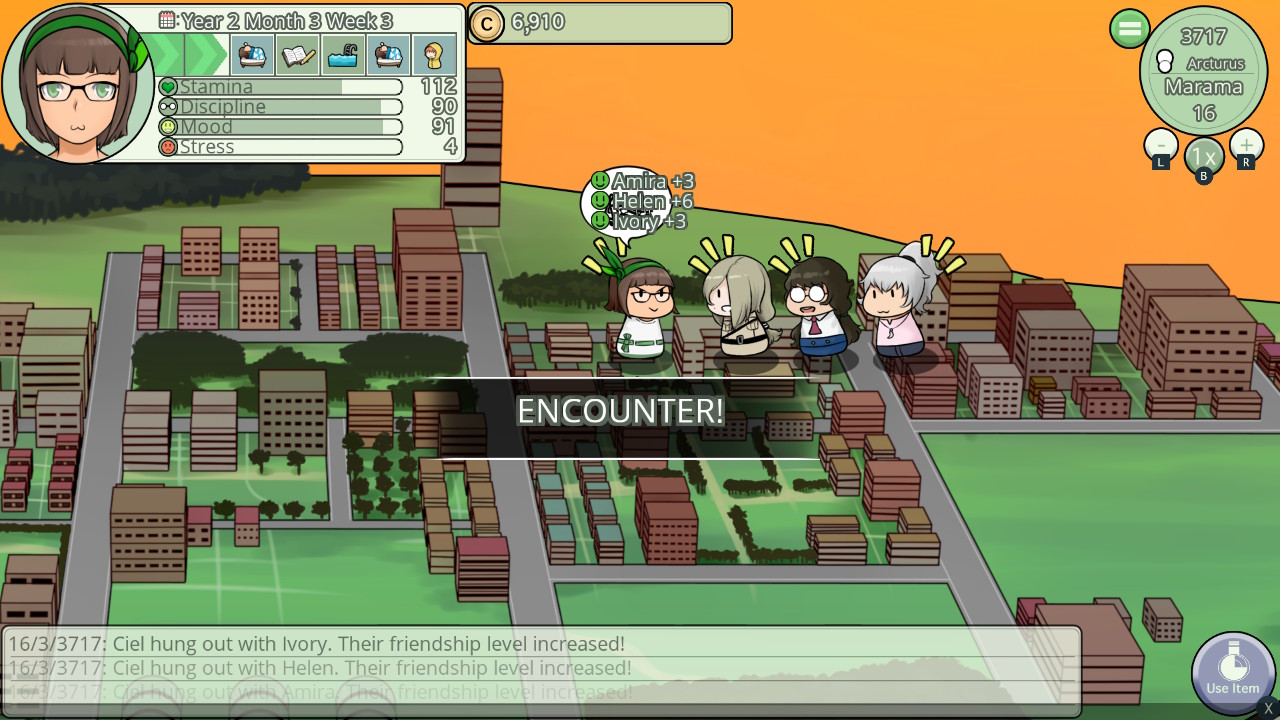
It’s Like If Persona 5 Didn’t Make You Go To Sleep All The Time
The main mechanic for advancing Ciel is by setting her weekly schedule. At the beginning of each week, you can set an activity for all seven days that Ciel will then execute. You can pay to have her attend classes, send her to do some part-time jobs, have her take a rest day, let her hang with her friends, or send her down to the surface to explore, among other activities. Completing activities will reward Ciel with growth in a variety of areas; she can grow one of her five base stats, strengthen one of her skills, or develop her relationship with an NPC friend. Hitting milestones in her stat, skill, or relationship growth unlocks new activities or develops new traits for Ciel, which in turn unlock new skills or various other rewards like equipment or growth bonuses.
In addition to setting Ciel’s activities, you can also set your own tasks for the week. You don’t get to go day by day for your own character, you just set one thing for the week, such as working to generate income or overseeing Ciel directly in certain ways. Finally, you can also set a meal plan for the week which dictates how fast Ciel grows in a variety of ways. At its most basic, a meal plan affects how tall Ciel is and how much she weighs; you can purchase more involved meal plans that encourage the growth rate of certain stats or skills as well. Most importantly, while there are a lot of events that happen, the game seldom forces you to take (or skip) certain actions, like certain other games with schedule management elements (*cough*Persona5*cough*). There are some holidays and set events that force your hand, but they are few and far between. Frankly, you can almost always use the holidays to your advantage since it’s a good idea to put a rest day or two into every week; just make the holiday your rest day and you have the rest of the week to work with.
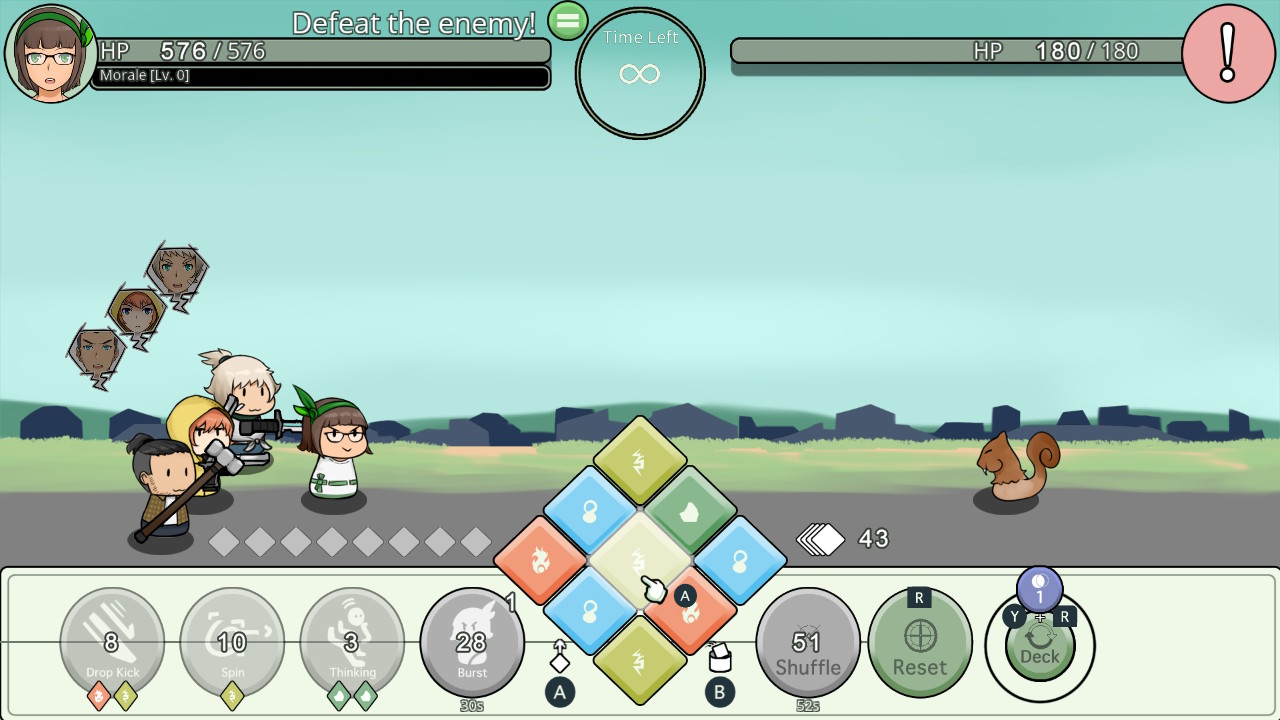
Card-Based Conflict
The game’s combat system was not my favorite part of the game at first, and there are a couple reasons for that. Reason one is that it just took me a while to get used to it. When a conflict (not necessarily combat; tests and quizzes in school, physical activities, and musical performances, among other things, all use the same system to resolve) arises, the screen shifts to a classic RPG setup with your characters on one side and your opponents on the other. There is a deck of diamond cards, with a hand of nine cards arranged in a diamond in the center of the screen. You make your moves by making sets of three cards with the same color.
Before conflict starts, in the weekly planning screen, you can set up to three techniques into a deck that is available during any conflict. Techniques can be used only if you have completed the sets necessary to activate it; for instance, if a technique requires one red set and one yellow set, you can’t use it until you’ve matched three red cards and three yellow cards into a set, and you can’t use it again until its cooldown time is past and you’ve collected more sets. In practice it’s not a complicated system, but it does take a few tries to get used to everything. The most important advice I can give you is that I found that this system works far, far better with the touchscreen than it does with the joysticks. You can use either, but the touchscreen is faster and more accurate for selecting the proper card.
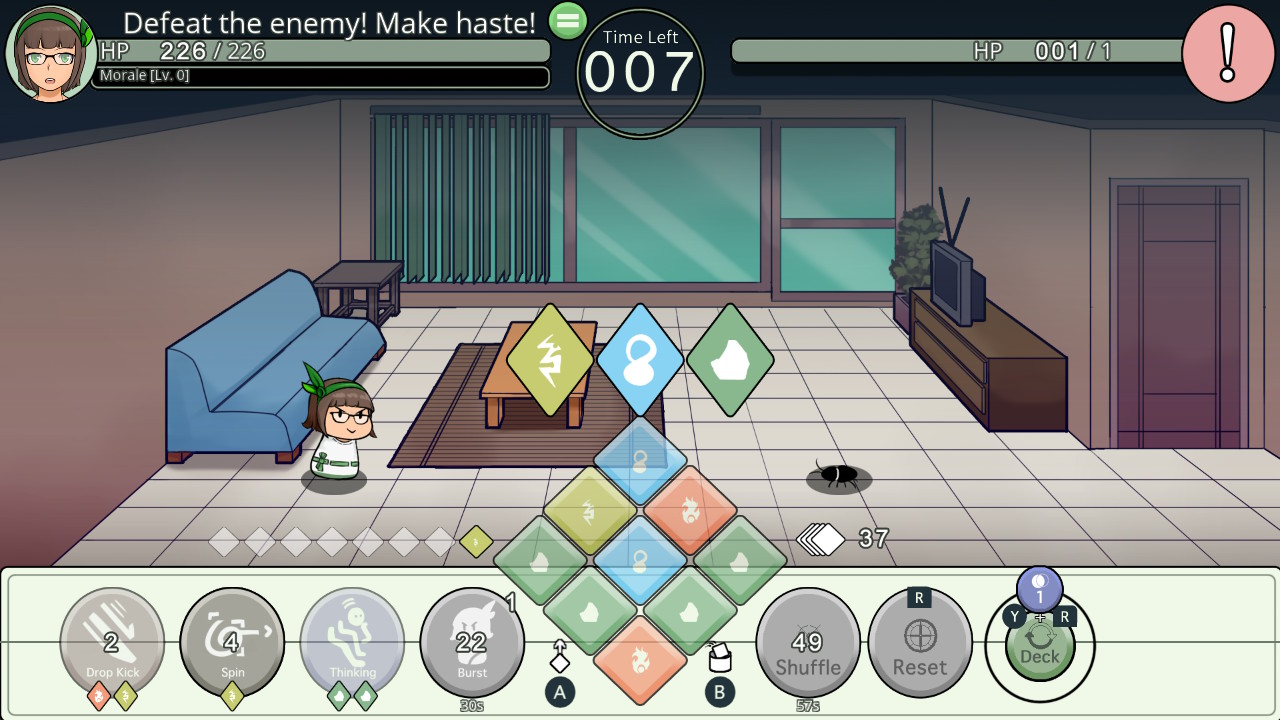
Waiting Is The Hardest Part
I did have some issues with the input during conflict, but by far my biggest complaint about the game is the accumulation of tiny wait times in conflict; if you miss completing a set you are delayed for a few seconds. I guess that makes sense; there should be some penalty for failure, after all. The problem is that even if you succeed, there is also a short wait. It is mostly a problem early on, as most challenges are timed. When you’re at a lower level that time is more precious because completing a set doesn’t net you as many points towards your goal and you need as much time as you can get; when your goal is to complete ten sets and you have to wait a second after completing each set, that means you’re losing a quarter of your time with the game’s standard forty-second time limit for many non-combat conflicts. Again, once you get used to the system it’s not as much of an issue, but issues like this early in the game can put players off from wanting to see the game through to the end.
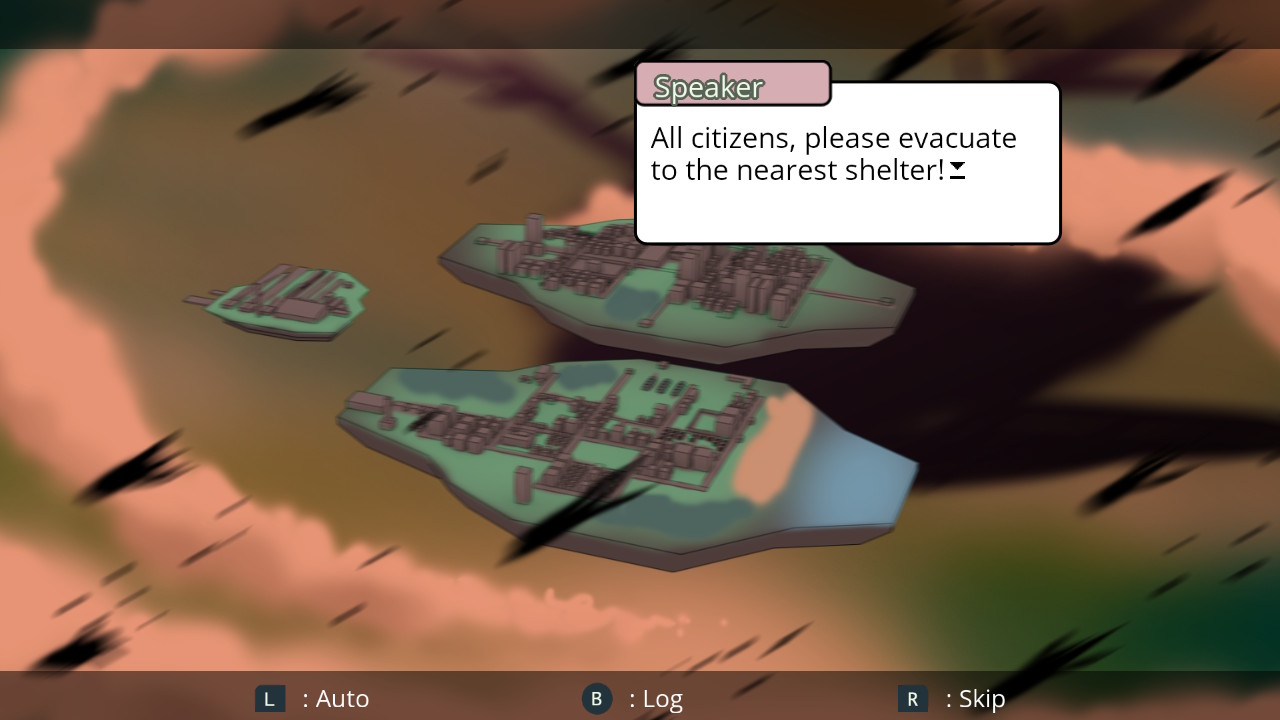
Simple But Not Cheap
Visually, the game uses a fairly simple visual novel-style setup most of the time. Story interactions use hand-drawn character models with a variety of facial expressions and poses for each character. They use a simple art style that is nonetheless endearing; like a child’s storybook or cartoon. During the week and during conflict, an alternate, much more cartoony visual style is adopted which is cute and makes what could be a fairly boring process of stat growth more visually interesting. The soundtrack is fairly reserved, which fits the more thoughtful gameplay style of the game, but it picks up during more intense or active scenes. Altogether it makes for a pleasant auditory experience, but honestly it doesn’t make or break the game in any significant way. The music is just good enough not to get in the way.
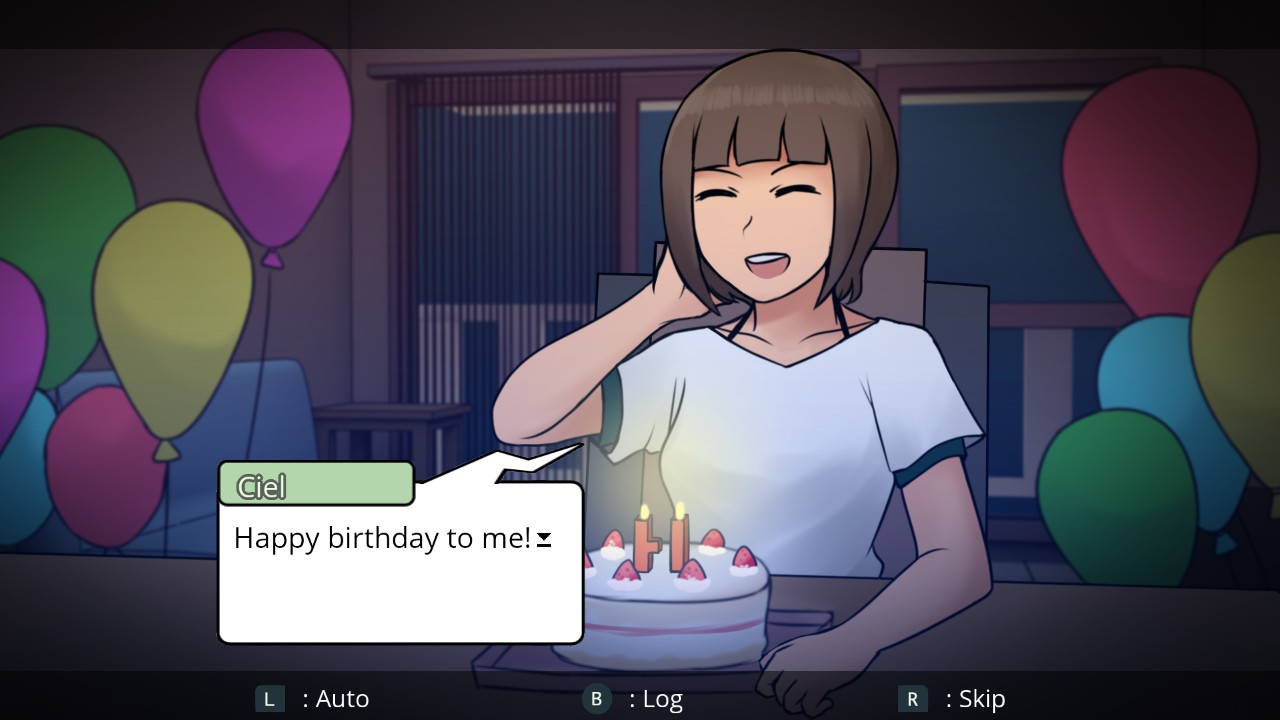
Every Bird Leaves the Nest
I can’t really think of any major complaints about my time with Ciel Fledge: A Daughter Raising Simulator. I didn’t particularly like the conflict system at first for reasons I’ve already outlined, but once I spent an hour or so getting used to the game I got over those issues pretty quickly. The story is engaging enough to paper over a lot of the monotony of sending Ciel out to grind stats over and over again and the overall lack of gameplay variety. I don’t know how many times I’d want to revisit the game to explore its branching stories, but it’s definitely a game I wholeheartedly recommend to gamers who are enthusiastic about unique narrative experiences.





Ciel Fledge: A Daughter Raising Simulator
$19.99
Follow Studio Namaapa
Follow PQube

*A game code was provided for review purposes.








